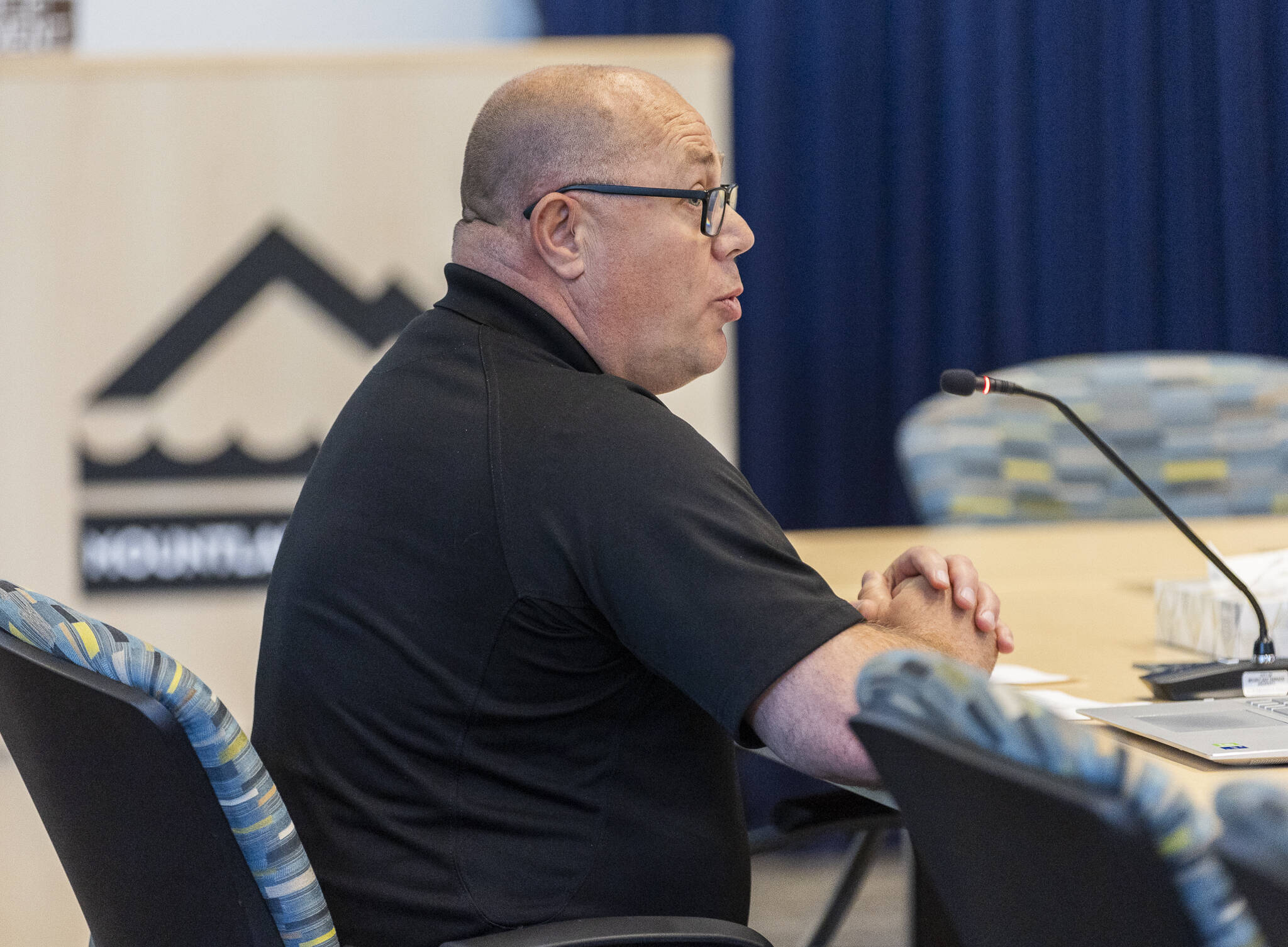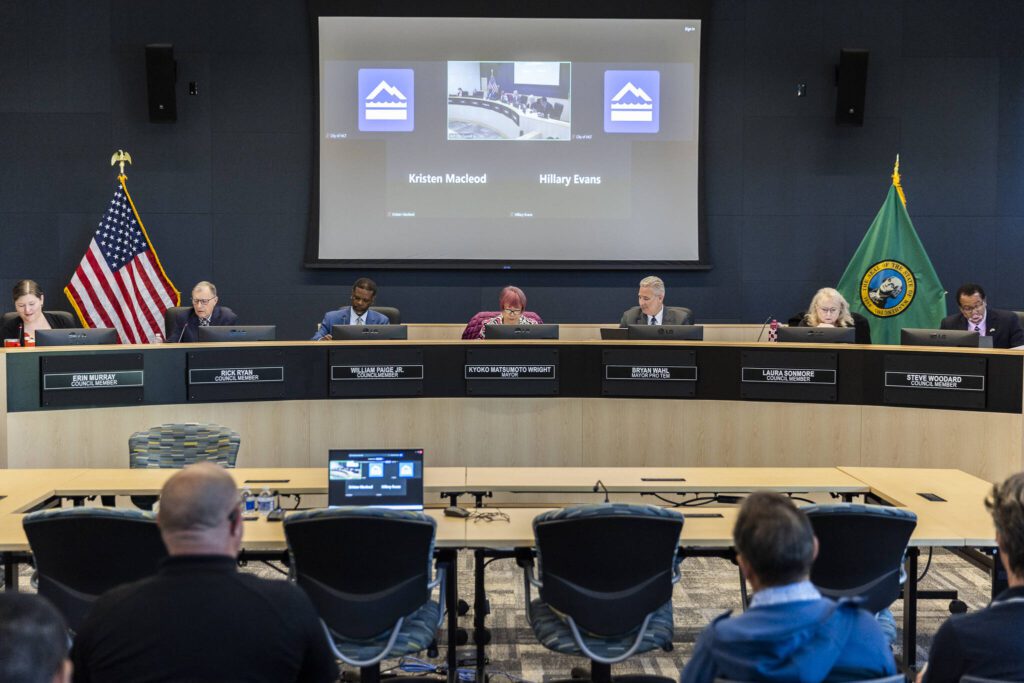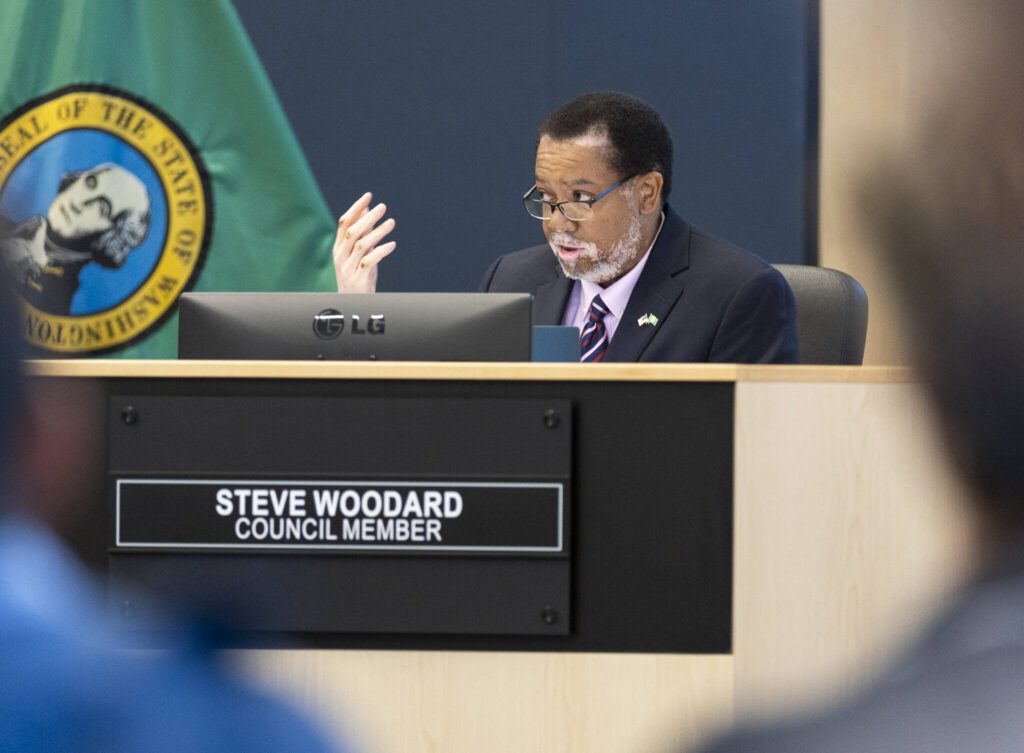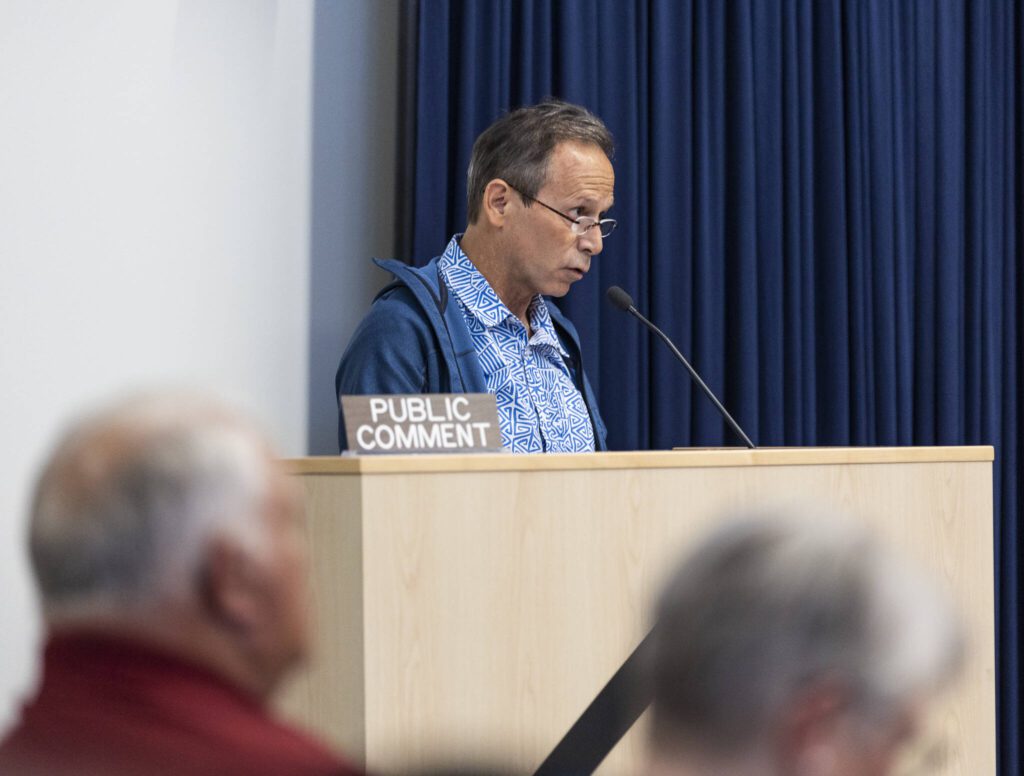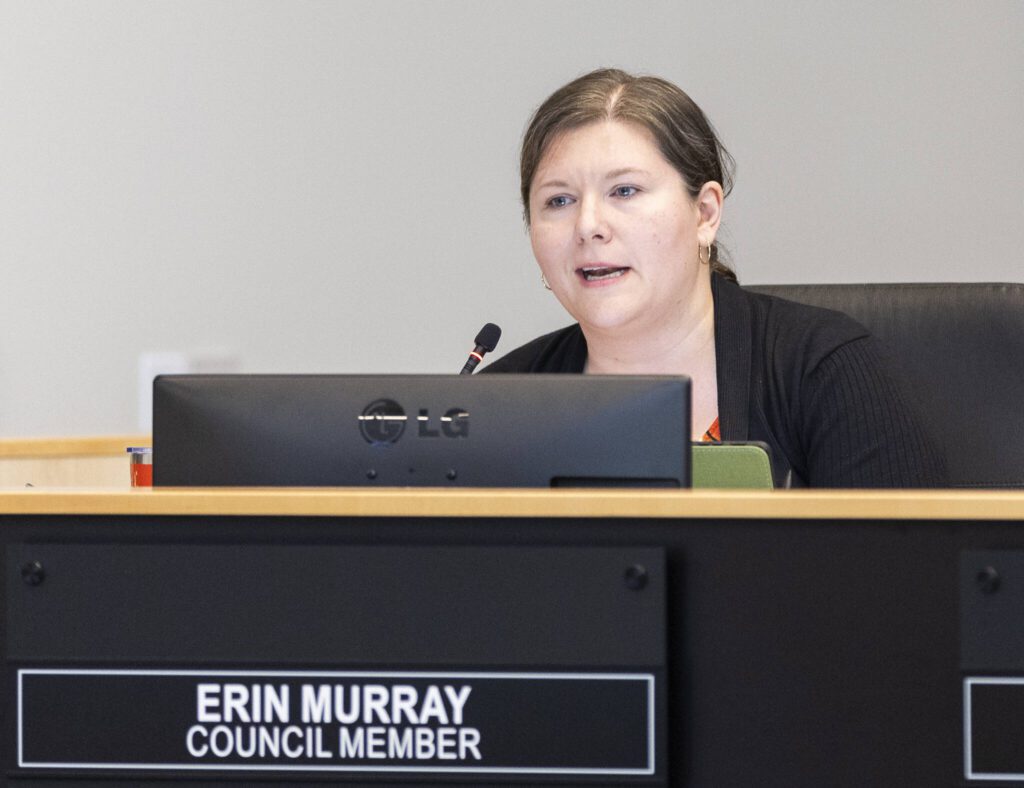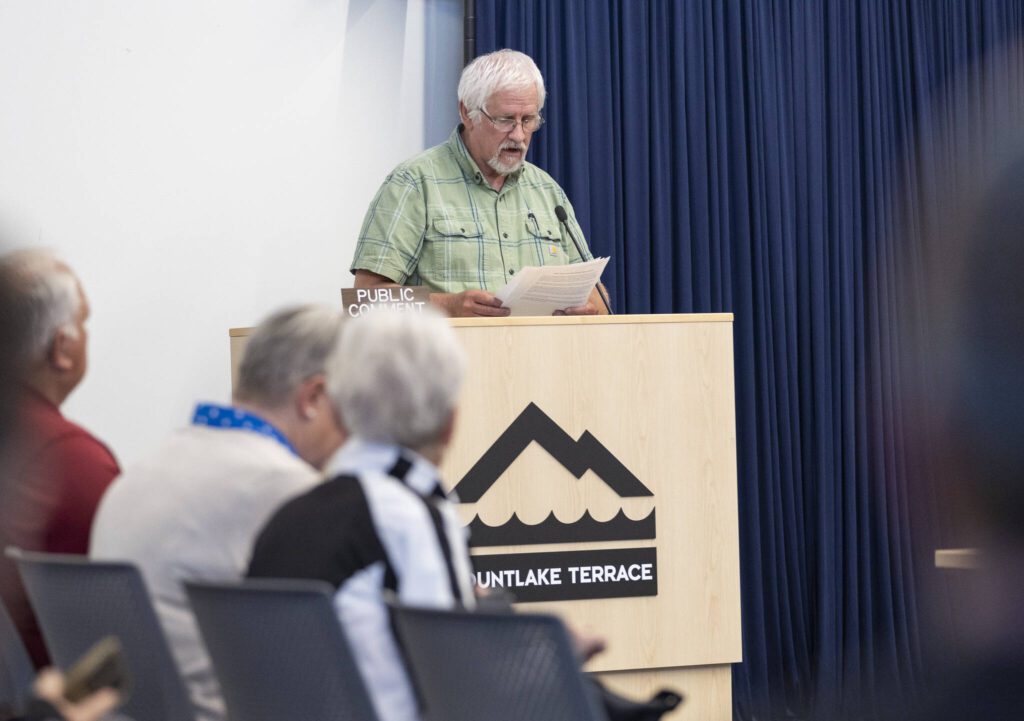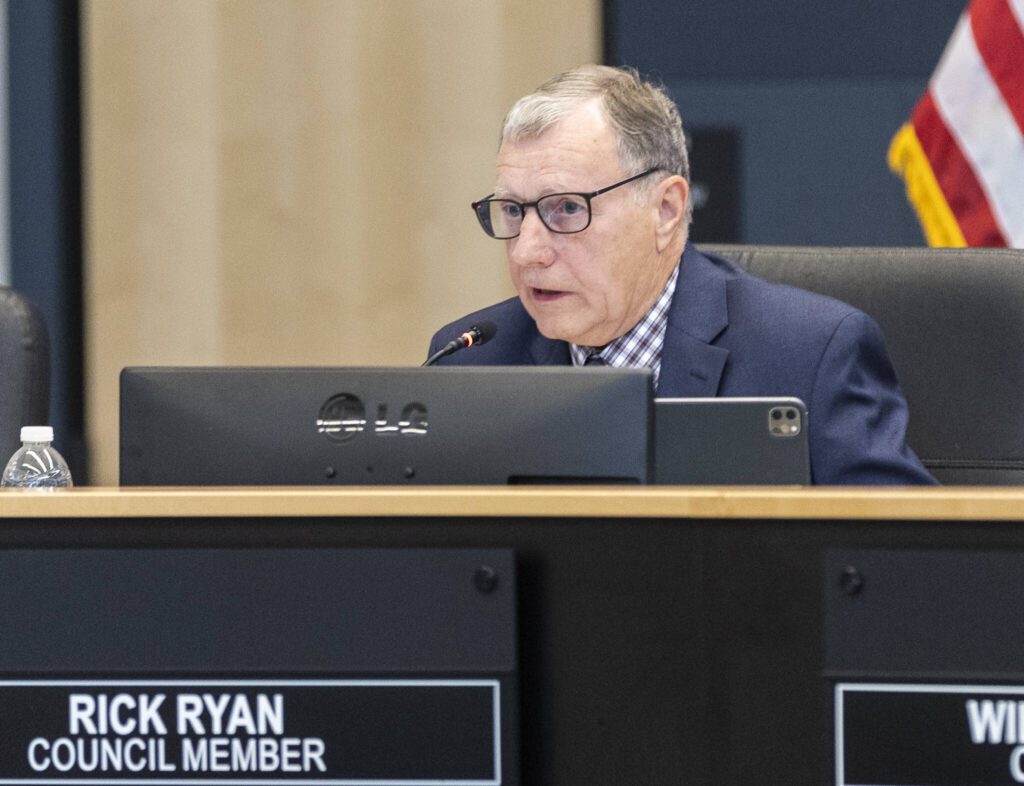MOUNTLAKE TERRACE — The Mountlake Terrace City Council approved an agreement by a 5-2 vote Thursday to install a controversial license plate camera system.
Residents filled the council chamber Thursday night, awaiting the council’s decision. Many attendees urged the council to vote against the agreement during public comment, citing privacy concerns.
The council has been discussing the $54,000 contract with Flock Safety since March. The contract includes nine cameras, placed on the city’s main roads, that analyze footage to track license plates.
Mountlake Terrace police started looking into the system after hearing about successes in nearby cities, including Everett, Mountlake Terrace Police Cmdr. Scott King said at Thursday’s meeting.
Everett installed its Flock Safety system in October 2024. Between then and March, the system assisted in more than 70 arrests, Everett Mayor Cassie Franklin said in her State of the City speech in March. According to the city’s most recent Flock report, the number of stolen vehicles per month in 2025 is down 67% from the city’s previous three-year average.
Council members Erin Murray and Steve Woodard voted against the agreement. Murray said she agreed with many public commenters who raised concerns about how Flock is legally allowed to use the data. One section of the city’s service agreement with Flock is unclear about when the company can release the data to third parties, she said. Flock can access, preserve or disclose footage to third parties if it has “a good faith belief” that the action is “reasonably necessary” to comply with a legal process or address security issues or “emergency situations,” the clause reads.
“I love the idea of trust, and we have a high degree of trust in our police force, but trust doesn’t go far when you are in a court,” Murray said.
Flock retains less than 1% of its nationwide data to ensure the system is up to date with new car models, said Kristen MacLeod, spokesperson for Flock Safety, at the meeting.
Council members who voted in favor of the agreement, including council member Laura Sonmore, said their priority is keeping community members safe.
“I believe that we need to at least have another tool in our toolbox to help our police catch people,” Sonmore said.
Police departments that use Flock cameras can elect to share the data with other law enforcement agencies. Those agencies can only access data points that will help them solve a specific crime, MacLeod said. Mountlake Terrace intends to give nearby law enforcement agencies that option, King said. Law enforcement agencies can add license plate numbers to Flock’s “hot list,” which will alert agencies if a wanted vehicle passes by one of their cameras.
Each city that uses Flock has a public-facing transparency portal. The portal lists the number of searches, “hot list” hits and vehicles detected in the last 30 days. Once the police department receives its required audit of the system, that information will also be on the portal.
In Washington, 80 cities, six counties and three tribes have installed Flock cameras, council member Rick Ryan said.
Lynnwood, Edmonds, Monroe, Arlington, Mill Creek are among cities that have approved use of the system in the past year, as well as the Snohomish County Sheriff’s Office.
“If we’re the only city that doesn’t have them, this would be a great place to steal a car, come through here, do crime and sell drugs,” Ryan said. “There’d be no deterrent except for the police we have now.”
From 2022 to 2023, Mountlake Terrace saw an 84% increase in stolen cars, Ryan added. Mountlake Terrace police will include Flock data in its quarterly reports to the council, King said.
The system has drawn criticism nationwide, including from the American Civil Liberties Union, over mass surveillance concerns. In February, a district court judge in Virginia ruled that license plate camera systems could be in violation of the Fourth Amendment in an ongoing case against Flock.
The data has a 30-day retention period, MacLeod said. Extending the retention period, or sharing the data with additional third parties, would require council approval. The system only tracks license plates and other details of the car. It does not include facial recognition or audio recording, she said.
Some community members raised concerns about recent news reports of Flock giving its data to U.S. Immigration and Customs Enforcement. In March, the Guardian reported that police in Westchester County, a sanctuary county in New York, shared Flock data with ICE in response to a Freedom of Information Act request.
“These cameras disproportionately harm immigrants and communities of color, posing a higher risk for them and amplifying existing biases in policing,” Mountlake Terrace resident Alvaro Guillen said. “Flock cameras are a dangerous expansion of government surveillance.”
Mountlake Terrace resident George Stanton referenced an article in 404 Media last week that found authorities in Texas used Flock cameras to identify someone who reportedly self-administered an abortion across state lines.
“(Data) is being misused, and we can hope that that is not the case in our community,” Stanton said. “But once a database like this has been built, you cannot go back. It will be available. It is susceptible.”
Some public commenters spoke in favor of the camera system, saying it would make them feel more safe and would support Mountlake Terrace police in their work.
“Very often we hear government leaders and citizens use terms of support for our police services indicating that they are always on the side of public safety and cracking down on crime and policies,” Mountlake Terrace resident Steve Mosman said. “But when a new technology is developed that could significantly increase the effectiveness of our police force, cries of invasion of privacy, potential misuse … or it just costs too much, are cries that negate the words of support that we have heard them stay in the past.”
Mountlake Terrace Mayor Kyoko Matsumoto Wright said she spoke with several dozen people in the county about their opinions on Flock cameras.
“One-hundred percent of the people I talked to about this are for the cameras,” she said, “and I talked to people from a lot of different places.”
In Everett and Lynnwood, council members unanimously voted in favor of the Flock system, with little pushback from the public, Murray said. The national political climate may have factored into the increasing controversy, she said.
“There is more and more concern every day about whether or not the rule of law and checks and balances in our country are being followed,” Murray said, “which I think is why there is such a shift in public concern.”
In his comments, Woodard said the main draw of Flock cameras for him was helping police find people who are missing. While he ultimately voted against the system, Woodard said this process has been one of the most conflicting in his time on council.
“This conversation has been important for me,” he said, “because it’s definitely helped me understand what I’m doing up here.”
Council members commended the community for their engagement on the issue. Murray said she received more public comment Thursday than in the entire five-and-a-half years she’s been on the council.
“You have really activated a power source that perhaps you haven’t realized: the power of the public record,” Woodard said. “Everything that you submitted is helping this council here, but it’s absolutely now searchable for other cities who are having these same conversations.”
In a statement Friday, Guillen said he is disappointed in the council for voting in favor of the Flock camera system.
“Ignoring the voices of the people of Mountlake Terrace who overwhelmingly opposed this mass surveillance system, they went ahead and voted against their will,” Guillen said. “Last night, the City failed its residents.”
Jenna Peterson: 425-339-3486; jenna.peterson@heraldnet.com; X: @jennarpetersonn.
Talk to us
> Give us your news tips.
> Send us a letter to the editor.
> More Herald contact information.
